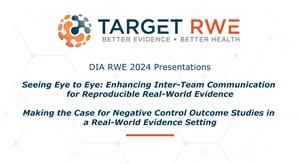DURHAM, N.C., May 22, 2022 /PRNewswire/ -- New data shows that more than a third (36.6%) of ulcerative colitis (UC) patients who have previously responded to advanced therapies experienced a loss of remission (LOR) in their symptom control, often within a year. The analysis from Target RWE's TARGET-IBD large, longitudinal cohort, Inflammation on Index Biopsy Predicts Loss of Remission Among Ulcerative Colitis Patients with Endoscopic Remission: a US Cohort Analysis, [Su1537] was presented today by Benjamin Click, M.D., Associate Professor of Medicine, Division of Gastroenterology and Hepatology, University of Colorado School of Medicine, at Digestive Disease Week in San Diego.
The study found that among patients in endoscopic remission, histologic inflammation was associated with a two-fold increased risk of subsequent LOR.
"While medications for UC work for a proportion of patients to induce remission, unfortunately, we often see a recurrence in disease activity and symptoms over time," said Dr. Click. "We sought to uncover factors predictive of relapse and found histologic inflammation despite endoscopic remission to be an important risk factor for subsequent LOR. Future research should focus on determining if treatment modification or intensification may be effective at preventing LOR in certain patients."
The Target RWE study included 513 UC patients who were eligible for analysis (53.0% female; median age at diagnosis 31 years; median disease duration 10 years). Corticosteroid-free adult UC patients in endoscopic remission on index colonoscopy (no evidence of endoscopic inflammation, erosions, or ulceration), with an index histology assessment and known duration of disease, enrolled in TARGET-IBD from July 2017 to June 2021, were included. LOR was defined as the presence of endoscopic inflammation, erosion, or ulceration on follow-up colonoscopy, or commencement of steroids.
TARGET-IBD is a five-year longitudinal observational study of more than 4,900 adult and pediatric patients (age two and above) who are undergoing therapy for IBD, including UC and Crohn's disease, at academic and community centers throughout the U.S. Real-world data is collected from consented participants, who may also provide patient-reported outcome measures and biospecimens. Learn more about TARGET-IBD publications here.
The Crohn's and Colitis Foundation of America estimates that more than 900,000 Americans live with UC.1 Crohn's disease and UC are often tracked together as they are both considered inflammatory bowel diseases (IBD). UC is found in the large intestine (colon) and rectum, while Crohn's disease can be found anywhere in the gastrointestinal tract, from the mouth to the anus.1 Chronic inflammation from IBD damages the gastrointestinal tract, so determining those at greatest risk for LOR is important. The U.S. Centers for Disease Control and Prevention estimates that the prevalence of IBD has increased significantly in the U.S. over the past two decades.2
As the industry's best-in-class, complete Real World Evidence solution, Target RWE is a distinctly collaborative enterprise that unifies Real World Data sets and advanced RWE analytics in an integrated community, shifting the paradigm in healthcare for how decisions are made to improve lives.
Target RWE sources unique, connected data sets across multiple therapeutic areas representing granular data from diverse patients in academic and community settings. Our rigorous, interactive, and advanced Real World Evidence analytics extract deep insights from Real World Data to answer the most complex questions in healthcare. Target RWE brings together the brightest minds in healthcare through an unmatched community of key opinion leaders, patients, and healthcare stakeholders in a collaborative and dynamic model. For more information, visit www.targetrwe.com.
CONTACT:
Kayla Slake
Marketing Manager
984.234.0268 ext 205
SOURCE Target RWE

WANT YOUR COMPANY'S NEWS FEATURED ON PRNEWSWIRE.COM?
Newsrooms &
Influencers
Digital Media
Outlets
Journalists
Opted In





Share this article